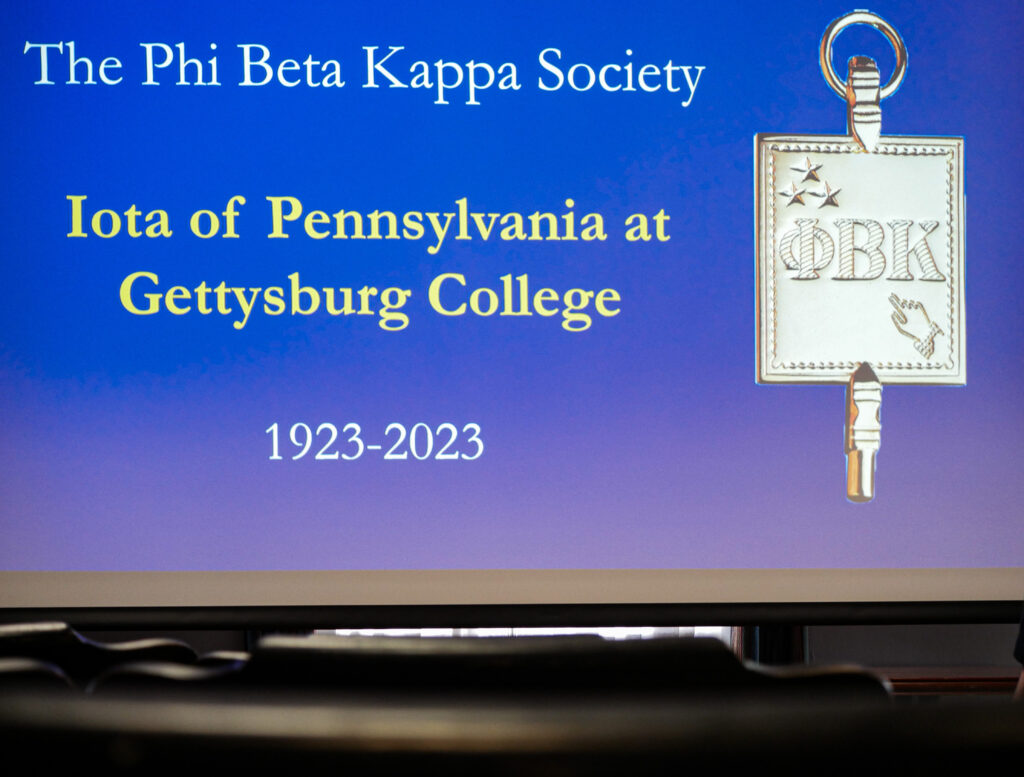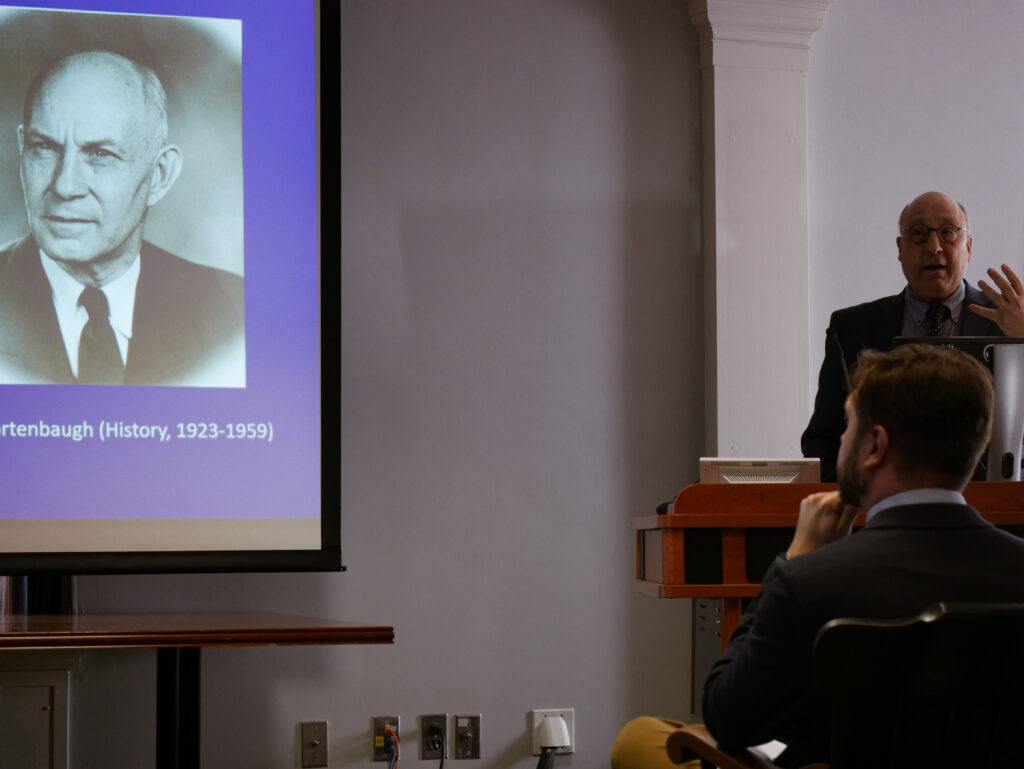Gettysburg College’s Ragged Road to a Phi Beta Kappa Chapter
By Kyle Hammerness, Features Editor

Professor of History Michael Birkner presents lecture about the history of Phi Beta Kappa on Gettysburg’s campus (Photo Sofia Gutierrez/The Gettysburgian)
On Tuesday, the friends of the Musselman Library, the Department of History and the Iota of Pennsylvania chapter of Phi Beta Kappa co-sponsored a lecture featuring Professor of History Michael Birkner ’72. Birkner’s lecture was entitled “The Ragged Road to a Phi Beta Kappa Chapter.”
The Iota of Pennsylvania chapter is celebrating its 100th anniversary this year; however, Birkner explained that the college did not have an easy road to establishing a Phi Beta Kappa chapter.
Birkner began the lecture by detailing how he discovered the story behind the Iota of Pennsylvania chapter. In the papers of President Henry W.A. Hanson, Birkner stumbled upon the dismissal, without due process, of physics professor Dr. Louis Parsons. As he dove deeper into the letters, he learned that Phi Beta Kappa was the excuse that President Hanson used to justify to the wider world why Parsons was dismissed.
Birkner said, “it had to do with him bringing obloquy on the name of Gettysburg College. To use Hanson’s words ‘disloyalty,’ and disloyalty was the basis for his firing.”
Birkner then turned to discussing a speech from longtime history department chairman Robert Fortenbaugh, which occurred during the 125th celebration of the college. Fortenbaugh, during his concluding remarks, said that after 125 years, Gettysburg College’s chapter of Phi Beta Kappa lay at the center of the college’s identity. In the speech, Fortenbaugh continued by explaining that Phi Beta Kappa’s three stars, friendship, morality and literature, were the guideposts that determined if the college’s founding fathers’ mission had succeeded.
Next, Birkner discussed how Gettysburg College, formerly known as Pennsylvania College, obtained a Phi Beta Kappa chapter. Having a Phi Beta Kappa chapter was a marker of institutional quality, and a group of alumni from Gettysburg College wanted a charter so they could be in that elite group.
This is where Parsons’ story intersects with Phi Beta Kappa. Birkner said Parsons disliked the college’s practice of granting “dummy diplomas.” A dummy diploma is a diploma granted to a senior who is very close to meeting the graduation requirements, but who has not yet met them. The granting of these diplomas began during the tenure of President Samuel Hefelbower and continued with President William Granville.
Birkner stated, “Parsons was upset during Hefelbower’s presidency, and then when we are applying for another Phi Beta Kappa chapter, the timing is such that the dummy diplomas were given in 1912 and again in 1913, and Parsons cannot contain himself. When Phi Beta Kappa is sending a representative to Gettysburg to evaluate the college, neither the president nor the provost were there to receive him. Worse for Gettysburg’s case, he spent his time with Louis Parsons, who cannot help himself and of course, you can imagine where Gettysburg’s application goes…to the bottom of the pile.”
Unfortunately for Gettysburg, the First World War and the conservative policies of allowing new chapters into Phi Beta Kappa hindered the college’s application, according to Birkner. Hefelbower, who started the dummy diplomas, tried to pressure Phi Beta Kappa by researching Who’s Who in America.
Birkner explained, “Hefelbower found that 3.9 percent of Gettysburg College alumni are listed in Who’s Who as notable men and women of the United States which not Colombia, not Amherst, not Bowdoin, not Williams could match Gettysburg College’s percentage.” This put Gettysburg on the same playing field as schools that already had Phi Beta Kappa chapters.
Birkner explained that the conservative attitudes had not ebbed, so Gettysburg College applied again for a charter in 1922, and after multiple letters from distinguished academics and the secretary of Phi Beta Kappa, Oscar Voorhees, Gettysburg College was granted a charter in 1923.
Birkner concluded by returning to Fortenbaugh’s lecture. He stated, ‘“Gettysburg College was a finer institution because of its connection to Phi Beta Kappa’ remains today in my view, what it was when he spoke in 1957 about the depths of Phi Kappa, friendliness, I should say, morality, literature. This is the foundation of a worthy college.”

Professor of History Michael Birkner presents a lecture on the history of Phi Beta Kappa at Gettysburg. (Photo Sofia Gutierrez/The Gettysburgian)
After the lecture, Clint Baugess, a research librarian and secretary of the Iota of Pennsylvania chapter, discussed the importance of the college having a Phi Beta Kappa chapter at Gettysburg College.
Baugess said, “it connects back to the college’s original goals of sort of the symbolic value of having the chapter and recognizing the sort of academic and professional accomplishments of its students.”
Baugess reflected on the college’s journey and what it represented. He said, “I think it’s indicative of the college’s ambitions for itself. They tried for almost two full decades to secure a chapter to say that they had made it as a college. So, for me, I think it shows sort of where the college started and where it wanted to be and shows the sort of intentionality and leadership that the college is able to do.”
Afterward, Birkner also spoke about the importance of Gettysburg’s chapter of Phi Beta Kappa, saying, “I think it has to do with aspirations that the college should aspire to academic excellence and to pushing people to be what they can be, and here’s the second part of it is that I want someone who graduates from Gettysburg College to be able to compete in graduate school, professional school or the workforce with people who graduated from Amherst. Williams, Yale, Princeton, Cornell, whatever the fine school is, I want them to not feel that they’re handicapped when they go on to the next stage in their life.”
Further, Birkner discussed the impact of “grade inflation” on the members inducted into Phi Beta Kappa.
“My issue is not with grade inflation generally because I can’t speak for or judge with colleagues and other disciplines feel makes for grades,” said Birkner. “That said there are certain departments that Gettysburg College which have been very liberal and giving A+’s and a department like Gettysburg does not give A+’s except in the rarest case. And I think in some cases, this puts our students at a disadvantage against the…students in departments where they’re giving out A+’s quite regularly.”
